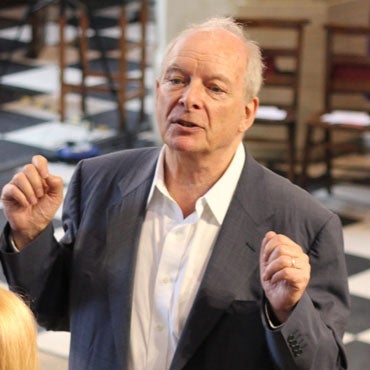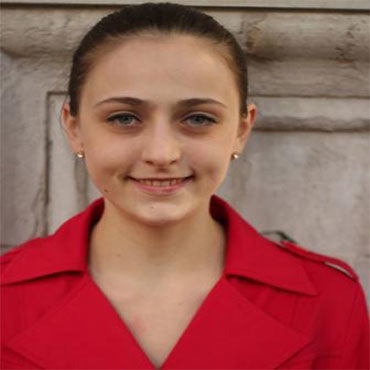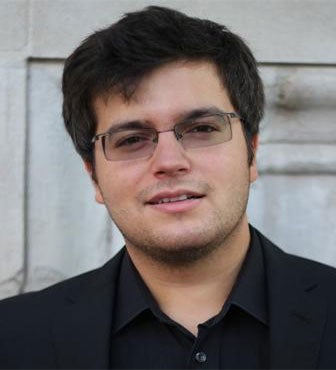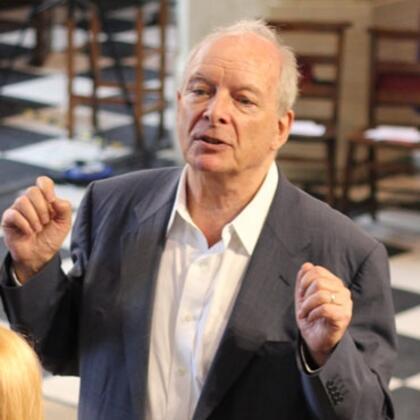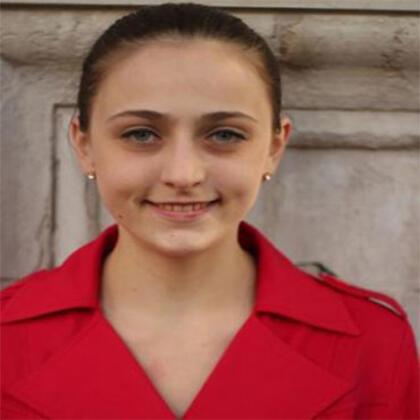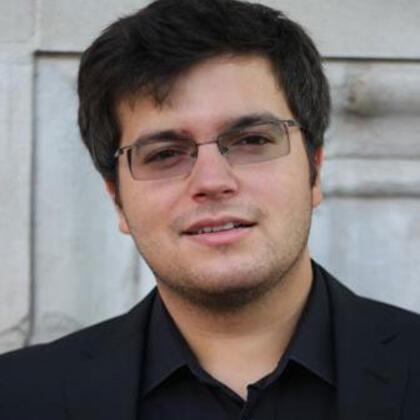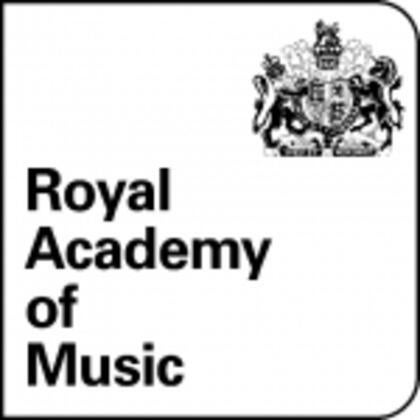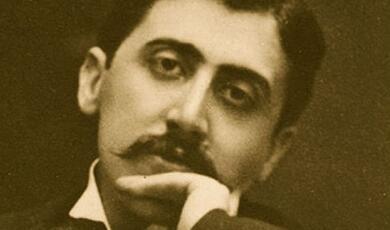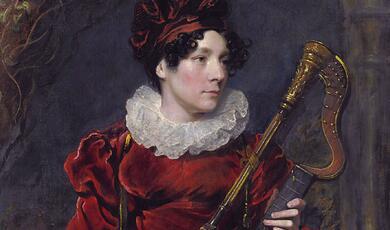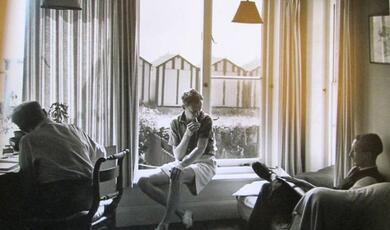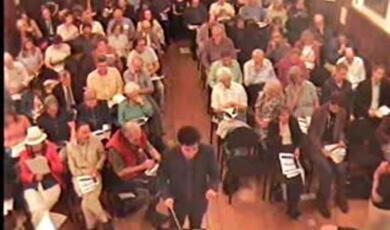4 October 2012
Vienna and Schubert: Fantasy in F Minor, D. 940
Professor Christopher Hogwood CBE
C: Professor Christopher Hogwood
F: Florian Mitrea
A: Alexandra Vaduva
C: The first three lectures and programmes of music in this series are all centred on Vienna and Schubert. Vienna, at the time this church was built, could not be ranked as a very grand or very central capital city to the goings-on in Europe - Rome maybe, certainly Paris, certainly Berlin, and certainly London. Vienna was much more of an Eastern city with a very mixed population – Poles, Bohemians, Moravians, Serbs, Croats, Turks, Greeks; its eyes were to the East as well as to the rest of Europe.
My reason for choosing it as an ‘anchor point’ for several musical lectures is the fact that we have made it the centre of our musical taste. Whether you agree with contemporary taste or not, most of the great composers that we are prepared to go and listen to at the Proms or on the BBC or buy records of are based around a Viennese tradition: Haydn, Beethoven, Schubert, Mahler, Strauss and Schoenberg. It has become the focal point of a lot of the major formats of European music – opera, symphonies, and so on. As a result, for a musician, Vienna looms as a much larger and more important place than it does for historians of, say, politics, medicine or botany.
It was a surprising rural city. You may wonder why so much of Schubert, Mozart and Beethoven harks back to the countryside. You did not have to go very far in Vienna to meet either the countryside or people from foreign countrysides. You had market gardens within the city. It was almost a self-contained community, without a terrific amount of political clout, except for the fact that all the representative families of the Austro-Hungarian Empire were resident in the city for some of the year. They mostly chose to be in Vienna during the cold months and out in their various estates all over Europe during the warm months, killing animals and drinking – the usual activities. This concatenation of aristocrats, all in their various palaces, led to the celebration of culture and the arts through patronage, so it was a wonderful magnet for people who felt they were not going to be sufficiently supported or rewarded in the outposts of the Empire. So, if you were a Czech, Bohemian, Moravian, Pole or a Hungarian, you saw that it was to your advantage to go to Vienna to show what you could do - how you could play, how you could compose, how you could paint, how you could write - and look for a patron.
Vienna, of course, was not as rich as we would like to think. Remember that, by the early nineteenth century, the city had been occupied twice by foreign forces. It had lost a great deal of cash and prestige, thanks to Napoleon, and was very much in debt. The currency had been devalued by nearly 50%. There was a general decline. After Haydn had finished working for the Esterhazy family (Hungarian but based in Vienna), the orchestra for which he had written so many of his symphonies was disbanded. The successor to his patron, Prince Esterhazy, decided there was just not enough money around and everything was reduced to a skeleton force.
The arts, therefore, tended to take over from politics as the way you could influence things. There were various people who would employ you if you were good: the state, the church and the theatres. There were five separate theatres in Vienna and each one had musicians, because theatre was impossible to think of without music. Even straight plays had music before and after them. So there was plenty of employment for the orchestral players and for the composers.
And of course, in addition, there were many coffee houses, bars, places where popular music would carry on. The Viennese, then as now, had a very welcoming attitude, hosting home concerts, soirees and salons. Competing aristocratic palaces all promoted towards their own particular ends and the younger generations organised regular meetings.
If you settled on Vienna as a place to live, you could forge a career as a composer, if you were lucky. If you found a publisher, that was great. There were publishers who centred on Vienna and transmitted their music around Europe. We also tend to forget that there were an enormous number of copyists about; printed music was not the only thing in the early nineteenth century. People were still making manuscript copies of music to transmit throughout Europe and, in some cases, as far as America.
You could also dedicate your music to somebody, if you managed to get their ear. All of Beethoven’s sonatas carry very elegant aristocratic dedications. This was, of course, a thank-you, but dedications were also expected to be acknowledged by quite a large sum of money.
You could be a teacher. There was the standard expectation that most people would be musically literate, that you would play one or two or possibly three instruments and could sing. The pay for a teacher, however, was much the same as the pay for a secretary – it was not so grand. Furthermore, as a music teacher in the nineteenth century you travelled to your pupils – they did not come to you.
There was more to the music business in Vienna than publishing, particularly instrument-building. For some reason, we do not quite know why, a lot of the keyboard, organ, harpsichord and later piano makers had moved to Vienna. It became a centre of piano design, manufacture, teaching, and concerts. This, of course, made great sense economically when the orchestras were going broke.
One of the major drawbacks to life in Vienna was the secret police. The Emperor felt threatened by many things, not only from the rest of Europe – Napoleon and French territorial designs - but also from Vienna’s historical enemy, the East. Security was high on everybody’s minds and the secret police therefore looked into everything; the censors had a word in nearly all music that was written, performed and certainly published. You had to get by the official censorship.
Vienna was also, I think, under the influence of musical crazes, perhaps no more than Paris, but probably more noticeably. The two most important ones to bear in mind while listening to mid-century Viennese music are the arrival of Rossini, with his Neapolitan Opera Company, and of course the absolutely astounding arrival of Paganini on the violin. The latter amazed a city of musicians; it took quite a lot of doing to impress the Viennese with a form of playing they had not advanced to.
For all these reasons, Vienna becomes a magnet for musical activities and products. But why Schubert three times?
Well, it is worth remembering that most of the celebrated Viennese musicians were not Viennese. Schubert is the only famous composer who was actually born in Vienna. The rest – the Haydns, the Mozarts, the Beethovens – came from elsewhere, they were attracted to the city.
He also carries, like Haydn, the ‘distinction’ of being a non-virtuoso. Haydn was very honest about his own playing on the piano and on the violin, and he said, “I am no great wizard.” He was a composer, but he could not match the virtuosity, say, of a Beethoven or a Rossini or a Paganini. Therefore, the concert platforms were not open to Schubert; he could not make a living from showy recitals.
However, he could make music that was acceptable to everybody, particularly the middle class, who were now financing most of the artistic activities in Vienna. He was not worried by the fact that he was often asked to provide convenient music, songs for soirees to be sung amongst a few friends without a public audience, music for piano, chamber music, music, as we shall hear, for piano duet. All these things could have been performed and listened to and critiqued and enthused over with very little outlay.
Schubert also suffered from that problem of dying young, so he was not around for long enough to do what the critics advised. Curiously, the critics - most of them in Vienna - advised Schubert to write fewer songs. We prize him for the enormous number of songs he was able to write. The critics said that these were all very fine and good, but only for soirees – why did he not take a greater interest in the forms that really mattered, such as opera, big symphonies or big choral music? But, in fact, when he tried this, none of them really gave him much support. He had no regular patron, and so his milieu was almost always that of likeminded people who were enthusiasts, sometimes suspiciously revolutionary, sometimes targeted by the secret police (as was Schubert), but they could produce music on their own terms, under their own conditions, in their own homes. As a result, a series of salons grew up around various intellectuals. There were some literary salons, philosophical salons and a few sewing salons (which we do not hear very much about), but the most famous were the salons promoting musical activities. The ones around Schubert became christened, even in their own time, as Schubertiadens. He had some more wealthy, bureaucratic friends. Vienna was a place where young men went to join the civil service, looking for a career in politics, making some money running government departments. On the strength of this income, they could run salons. It was not just sitting and listening to songs and exclaiming about literature. It was generally about having a fine, drunken time.
There was also, curiously, a little bit of early music going on in Vienna. We sometimes forget that the history of early music did exist in the nineteenth century. It is not a twentieth century invention. There was a very important man, worthy of more research, called Raphael Kiesewetter, who ran salons aimed at producing music from the past. To those asking to attend, he wrote: “Please do not come with great expectations – it’s only my small domestic portable and itinerant orchestra which gathers and the performers are impromptu. We meet at 6.30, make music until about 10.00, then we take some small refreshments, which may also perhaps not end with singing.” Kiesewetter also supported several concerts by Schubert. It is in that atmosphere, rather than in a grand baroque or public atmosphere, that you have to imagine this music taking place, played by a Viennese composer, Viennese friends, on a piano made in Vienna for the young Viennese slightly wealthy middle class – a very “Biedermeier” existence!
We are very fortunate today to have two lovely pianists from the Royal Academy, who are going to play one of the last pieces that Schubert wrote, the Fantasy in F Minor. I think you have its basic facts on your programmes, but it is worth just looking at it and working out why it is a fantasy, how it functions, what is special about this music, and what is especially Schubertian about the way it is put together.
Schubert had written quite a few pieces under the name of fantasy. Fantasy is the sort of name you give to something when the standard formats do not fit – you cannot call it symphony for piano, you cannot really call it a sonata for piano. It is in a single stretch, but it in fact has inside itself all the components of a symphony. Once you have heard it, you will understand the compulsion some people have recently had to orchestrate it; it has all the language and stature of a piece designed for a grand orchestra. However, as I said, Schubert did not have access to a grand orchestra, nor support for giving grand orchestral performances. Nearly all his orchestral works were performed either by an amateur orchestra or played once and then forgotten. He dedicated this fantasy to Karoline Esterhazy, a member of the Esterhazy family connected with Haydn, who was called “the love of his life”. In fact, I think he was hoping that she might turn out to be a patron - but she did not.
In all, Schubert wrote some 30 pieces for four hands at one piano. There is a distinction between the piano duo, which usually means two pianos, and the piano duet, which is four hands squashed onto one keyboard. You can even have six hands on one keyboard. I have never seen eight on one keyboard – it would get a bit tight. But, for domestic purposes, four on one keyboard is a great deal easier than trying to manage two Viennese pianos and keep them in tune.
The Fantasy begins in a typical Schubert way, with a clear song melody that, once you have heard, you will never forget. I say it is “clearly a song melody” because, rather like Mozart’s G Minor Symphony, Mozart sets up the piece with the accompaniment before the melody enters. This employs few notes, but it is definitely in the sombre, melancholic, slightly ‘acid’ tones that people associate with the key of F Minor.
Schubert uses and relinquishes minor keys, just like Mozart. He chooses the right moment to shift that same tune into the major, with the effect that the major can often manage to sound sadder than the minor. You sense the struggle of reaching the major within what is not inherently an F Major tune.
The other interesting thing about this piece, and any fantasy of course, is that it is a single, through-running piece. However, as you will see in your programmes, there are four major sections, exactly as you would expect in any symphonic work or exactly like the movements of a sonata: an opening, a slow movement, a scherzo and a finale. When they are put into fantasy form, you have one extra challenge, or possibility, which is that the links between these sections have to be audible. With a Beethoven sonata, in most cases, you will finish the first movement, clear your throat and blow your nose and look around and smile, and then you will begin a second movement, in a disconnected style or key. It is quite rare for a couple of movements to be linked, and it is almost impossible, in a sonata, for all movements to be conveniently linked. A fantasy, being a single canvas, goes through the business of making transitions, and it is in this, I think, that Schubert particularly excels. You will notice how he gets from one point to another, both in mood and in key. You do not need to know a lot about the theory of harmony to realise that keys can be very remote from each other, even when they look adjacent on the keyboard.
Just give an F minor chord…
[Note plays]
And if you just go up a semi-tone to F sharp minor…
[Note plays]
It is a big jolt. It is not an easy transition. You can modulate through a lot of other keys to get there. It is an example of Schubert’s trickery; he goes from an opening in F minor to the same very memorable melody in F major, and before you know what has happened, you have shifted through a lot of harmonies and ended up one-semitone higher, which is quite an unnatural shift.
In considering the origins of Schubert’s ideas for the shape, form and gestures of this piece, it is worth examining previous piano duet music. There was not a great deal. Beethoven had written one or two fairly light pieces. Mozart, of course, had written four-hand sonatas as well as two-keyboard sonatas. More importantly, Mozart had written pieces for mechanical organ. There was a special automaton in Vienna that could play extremely complicated music on a sort of flute organ. Its owner, Mr Demel, had commissioned various composers to write new music for it. Mozart wrote two fantasies, both in F, that looked backwards to the style of the baroque, as he saw it, a sort of Handelian style, which is very much like what you just heard in the F sharp/minor moment - lots of rumbling trills and dotted rhythms. It sounds a bit like a baroque French overture or Handelian rhythms. They felt it spelt out an earlier regime. This is just the opening of the F minor fantasy written for mechanical organ. Although it was on a mechanical organ, Mozart had written it out on four staves to help the man who had to do the pinning of the barrels on this organ. It was in a sort of four-stave score, and the publisher took this to be a sign that it was a piano duet. In fact, it does not make for a terribly easy piano duet, because your fingers are all inside each other – the parts are not written thoughtfully for the piano. This is not Mozart’s fault because he was not thinking of it as such. It came out in print in the 1790s, and Schubert would therefore have been well aware of it: the key, the style, the fact that it was taken as being music for four-hands. You will notice that he begins in a very baroque manner, with lots of little jagged figures, and then, almost immediately, he goes into a fugue. Schubert is also going to move into a fugue by the end of his piece. But this is the Mozart model.
[Music plays]
As you see, when you write music for a mechanical instrument, there have to be no concessions to what fingers can actually play, so trills can occur all over the place and the parts can become as involved as you like, and it takes quite a bit of untangling.
Schubert takes this as his cue. I think there can be no other explanation for why, at the end of his fantasy, having quoted again and again this melancholic opening theme, he chooses to derive a complete fugue from it.
[Music plays]
You will notice the same complications – it is a little better laid out for the hands, I think, but not much better than in the Mozart example.
So far, we have not talked about the scherzo. The full format of the piece is fantasy opening, slower movement, repeat of the fantasy opening, little memories, a fully-fledged scherzo (which could, and has been, very well-orchestrated in an orchestral manner), more of the fantasy opening, and then the fugue. After the fugue, you get the bleakest possible cadence that Schubert ever devised, featuring lots of crashing harmonies and which refuses to end up in the major key, as you might be hoping. But the one moment of more or less happiness in all of this is this exuberant scherzo.
[Music plays]
So, those are the component parts. We have not shown you the ingenuity of moving between the one and the other, all of them being in keys that are extremely foreign to each other.
Before we hear it, I would like to just ask a few questions of the piano duet players. It is a very unforgiving instrument for duet playing, because it is immediately apparent if you have not put a chord down together. If you just say, “Go and play!”, the effect will be somewhat scattershot. I imagine it consists of quite a lot of breathing together.
A: That is true. That is one of the secrets: we have to breathe together. When we play solo, we tend to place more emphasis on the right hand, and the left hand is more like an accompaniment, depending on the pieces of course. But when we play together, we have to forget that. For example, Florian’s right hand is not the main voice – it is mostly an accompaniment, and this is a bit tricky. You have to get used to toning it down.
C: When you are the bottom pianist, one has to remember that while your right hand is a middle voice, your left hand, the bass, is supporting three other hands above it, not just one, so it is even more important.
F: Yes, true.
C: Do you find that institutions like the Royal Academy take the teaching of four-hand music as seriously as solo music?
A: Definitely.
F: I think they do when students have the initiative. We have been very, very generously supported by the Academy. We have received coaching from our piano teacher, from our chamber music coach, but also we have recently performed in a master-class given by Imogen Cooper. That was a fantastic opportunity because she has a wonderful experience of playing this sort of music. It was a life-changing experience, really.
A: Enlightening, yes, definitely.
C: What sort of things did she cover that you hadn’t thought of before?
F: Mainly the emphasised unity between ourselves. I think we were doing our job quite well, we were counting together and we were mainly together, but it was not just the physical action of playing the chords together but also the tone quality, unifying it, because there is a big danger of sounding very bombastic and loud. The piano can be a loud instrument, so when you get two people, very enthusiastic about the music they play, it can sound very, very loud. It is a question of tempering our personalities, not in a bad way but in order to create a new personality that is formed by the two personalities.
C: And you were playing for her four-hand…Mozart?
A: Yes, we played the Mozart.
F: Mozart, F Major Sonata.
C: Oh right, yes. Do you also play two pianos?
F: Not yet.
C: It is clear how you can organise yourselves when you are sitting next to somebody and playing, but when they are facing you, with two nine-foot Steinways between you, forming a connection requires a quite different system of navigation, I find.
A: Yes. We have had separate opportunities to perform on two pianos. I think you have done a Bartok sonata?
F: Yeah, I have done two double piano concertos: the Bach double and Bartok double in the sonata version.
A: And I have done something more contemporary, Reich’s Variations for Two Pianos.
C: Of course, the interesting thing to remember is that, when Schubert played this, it was probably only a few months before he died. It was at a hastily arranged musical soiree. I suspect it was not rehearsed.
Therefore, I think you are probably about to hear a much better, polished and rehearsed performance than the composer himself ever heard. That goes for a great deal of music that we hear nowadays. So, put it back into its “Biedermeier” context of a jovial crowd of enthusiastic young bohemians in Vienna being entertained by Schubert and his friend Lachner, the one performance, I suspect, that they were able to give while Schubert was alive of this fantastic F minor fantasy.
Thank you.
[Music plays]
© Christopher Hogwood CBE 2012


 Login
Login
